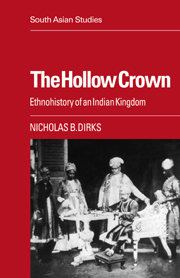Book contents
- Frontmatter
- Contents
- List of illustrations
- List of maps
- List of tables
- Preface
- Glossary of terms
- Map 1 Madras Presidency, 1900
- Map 2 Pudukkottai State
- The Tondaiman line of Pudukkottai
- PART 1 INTRODUCTION
- PART 2 HISTORY AND ETHNOHISTORY
- PART 3 A LITTLE KINGDOM IN THE OLD REGIME
- PART 4 SOCIAL RELATIONS OF A LITTLE KINGDOM
- PART 5 COLONIAL MEDIATIONS: CONTRADICTIONS UNDER THE RAJ
- 10 Agrarian rebellion? Last gasp of the old regime
- 11 The colonization of the political order: land settlements, political intervention, and structural change
- 12 Temples and conflict: the changing context of worship
- 13 The theatre state: princely politics in colonial south India
- PART 6 CONCLUSION
- Appendix: Land and privilege: inams in Pudukkottai
- References
- List of records and abbreviations
- List of archives and record offices
- Index
- CAMBRIDGE SOUTH ASIAN STUDIES
10 - Agrarian rebellion? Last gasp of the old regime
from PART 5 - COLONIAL MEDIATIONS: CONTRADICTIONS UNDER THE RAJ
Published online by Cambridge University Press: 25 October 2009
- Frontmatter
- Contents
- List of illustrations
- List of maps
- List of tables
- Preface
- Glossary of terms
- Map 1 Madras Presidency, 1900
- Map 2 Pudukkottai State
- The Tondaiman line of Pudukkottai
- PART 1 INTRODUCTION
- PART 2 HISTORY AND ETHNOHISTORY
- PART 3 A LITTLE KINGDOM IN THE OLD REGIME
- PART 4 SOCIAL RELATIONS OF A LITTLE KINGDOM
- PART 5 COLONIAL MEDIATIONS: CONTRADICTIONS UNDER THE RAJ
- 10 Agrarian rebellion? Last gasp of the old regime
- 11 The colonization of the political order: land settlements, political intervention, and structural change
- 12 Temples and conflict: the changing context of worship
- 13 The theatre state: princely politics in colonial south India
- PART 6 CONCLUSION
- Appendix: Land and privilege: inams in Pudukkottai
- References
- List of records and abbreviations
- List of archives and record offices
- Index
- CAMBRIDGE SOUTH ASIAN STUDIES
Summary
From late 1853 through the better part of 1854, Pudukkottai was the scene of an agrarian rebellion of sufficient seriousness for British troops to be called into the state. As it turned out, that was all that was needed; the mere presence of the troops checked the potential violence, if not the fury, of the angry “mob.” But however muted the “rebellion,” it did have serious consequences for the state, in the events associated with it and in the measures taken by the British to assure that the problem never recurred. During the revenue year 1853–54, over half the assessed tax went uncollected; Rs. 146, 859 was unpaid out of a total assessment of Rs. 211, 226 (MPC, no. 7, 1 August 1854, p. 3339). Armed bands roved throughout the state and an unusually heavy incidence of rural violence was reported; even in towns shopkeepers closed their shops and refused to pay their municipal taxes. During the most critical phase of activity large crowds collected in Pudukkottai town and threatened to cause major disruption before troops arrived.
The rebellion was led principally by Venkannan Cervaikarar, a palace uriyakarar who had been dismissed from service on four separate occasions for reported insubordination. Among his supporters he claimed a wide cross-section of Pudukkottai society, ranging from amarakarars and uriyakarars to miracidars and merchants.
- Type
- Chapter
- Information
- The Hollow CrownEthnohistory of an Indian Kingdom, pp. 309 - 323Publisher: Cambridge University PressPrint publication year: 1988



